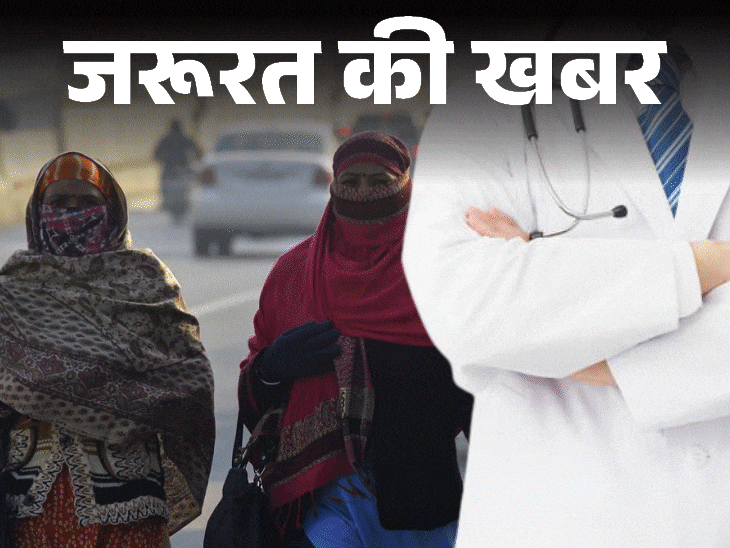Due to snowfall in the mountains, many North Indian states including Delhi NCR are in the grip of a cold wave. According to the Indian Meteorological Department (IMD), there will be no relief in the coming week either.
In such a situation, one must be extremely careful to avoid this. A little negligence can cause serious illnesses. In some cases, the cold snap can also be fatal.
So come on, today in the news of need we are going to talk about what to do to avoid the cold snap? You will also learn that-
For which people is the cold snap most dangerous? What precautions should you take during a cold snap?
Expert: Dr Satyendra Kumar Sonkar, Department of Internal Medicine, King George Medical University, Lucknow
Question: What is a cold snap?
Answer – According to the Indian Meteorological Department, when the minimum temperature in the plains is 4 degrees Celsius or less, it is called a cold wave. Apart from this, if the temperature is below 10 degrees Celsius and it suddenly drops from -4.5 to -6.4 degrees, it is also considered a cold wave. Cold waves are generally observed during the months of December and January.
Question – In which states of the country is there a greater risk of cold snaps?
Answer – Generally, cold wave outbreak is observed in Punjab, Haryana, Rajasthan, Uttar Pradesh, Madhya Pradesh, Chhattisgarh, Bihar and Jharkhand including Delhi NCR. Apart from this, the effect of cold wave is also visible in hilly states like Jammu and Kashmir, Himachal Pradesh and Uttarakhand.
Question: How dangerous is the cold snap for our body?
Answer – Dr. Satyendra Kumar Sonkar tells that cold wave affects our health in many ways. This affects our heart as well as our neurological health. Understand from the graph below how the cold snap affects our health.
Question: Why does the risk of heart attack or stroke increase during the cold snap?
Answer: In cold weather, the heart has to work twice as hard to pump oxygen throughout the body because the arteries narrow from the cold. Because of this, blood flow slows down and the heart muscles receive less oxygen. The risk of stroke or heart attack therefore increases.
Question: Why does the risk of hypothermia increase during the cold snap?
Answer – Typically, a healthy person’s body temperature is 98.6 degrees Fahrenheit, or 37 degrees Celsius. Due to prolonged cold, body temperature begins to decrease. When our body temperature drops below 95 degrees Fahrenheit, or 35 degrees Celsius, hypothermia can occur.
Its first symptoms include intense chills, numbness in the hands and legs, and a cold body. If not treated in time, the victim may fall into a coma or even die.
Question: What are the symptoms observed in a person when affected by a cold spell?
Answer- Among the symptoms of cold snap, fingers, toes, earlobes and nose become numb. There are other symptoms as well. Understand it with the pointers below-
Body cold. Tremors of the body and chattering of the teeth. Numbness of hands and legs. Nausea or vomiting.
Question: For whom is the cold snap most dangerous?
Answer – The cold spell can engulf anyone. However, some people are at greater risk. Such as-
Children are more exposed to cold snaps. Because of this, they may become vulnerable to illnesses like colds, coughs, pneumonia and diarrhea. Patients with serious illnesses and the homeless are also at greater risk of cold snaps. risk of cold snap. The risk of problems increases Due to low immunity, the risk is higher in older people.
Question – What precautions should be taken to avoid a cold snap?
Answer – Dr. Satyendra Kumar Sonkar tells that the body starts feeling cold as soon as it comes in contact with the cold wave. Body temperature should not be lower than 35 degrees Celsius. Anything less than this can lead to serious health problems. Therefore, some things need to be paid special attention during the cold snap. Understand this in the graphic below-
Question – What mistakes should you avoid making during the cold snap?
Answer: To avoid the cold snap, stay indoors as much as possible. Aside from that, keep a few things in mind. Such as-
Do not keep your hands, legs and head uncovered. Wear gloves on your hands and socks on your feet. Do not let the body become dehydrated. Do not drink alcohol or sugary drinks. Avoid contact with cold air.
Question – What to do if you are hit by a cold snap?
Answer: If severe cold snap symptoms appear in a person, contact the doctor immediately. Do not be careless as this can have many serious consequences.
of need
Necessary news – Drink these 8 soups daily in winter: Full of nutrition, keep the body warm from the inside.
In cold weather, energy consumption increases due to lower body temperature and slower metabolism. In such a situation, hot food not only maintains body temperature but also keeps the digestive system active. …

